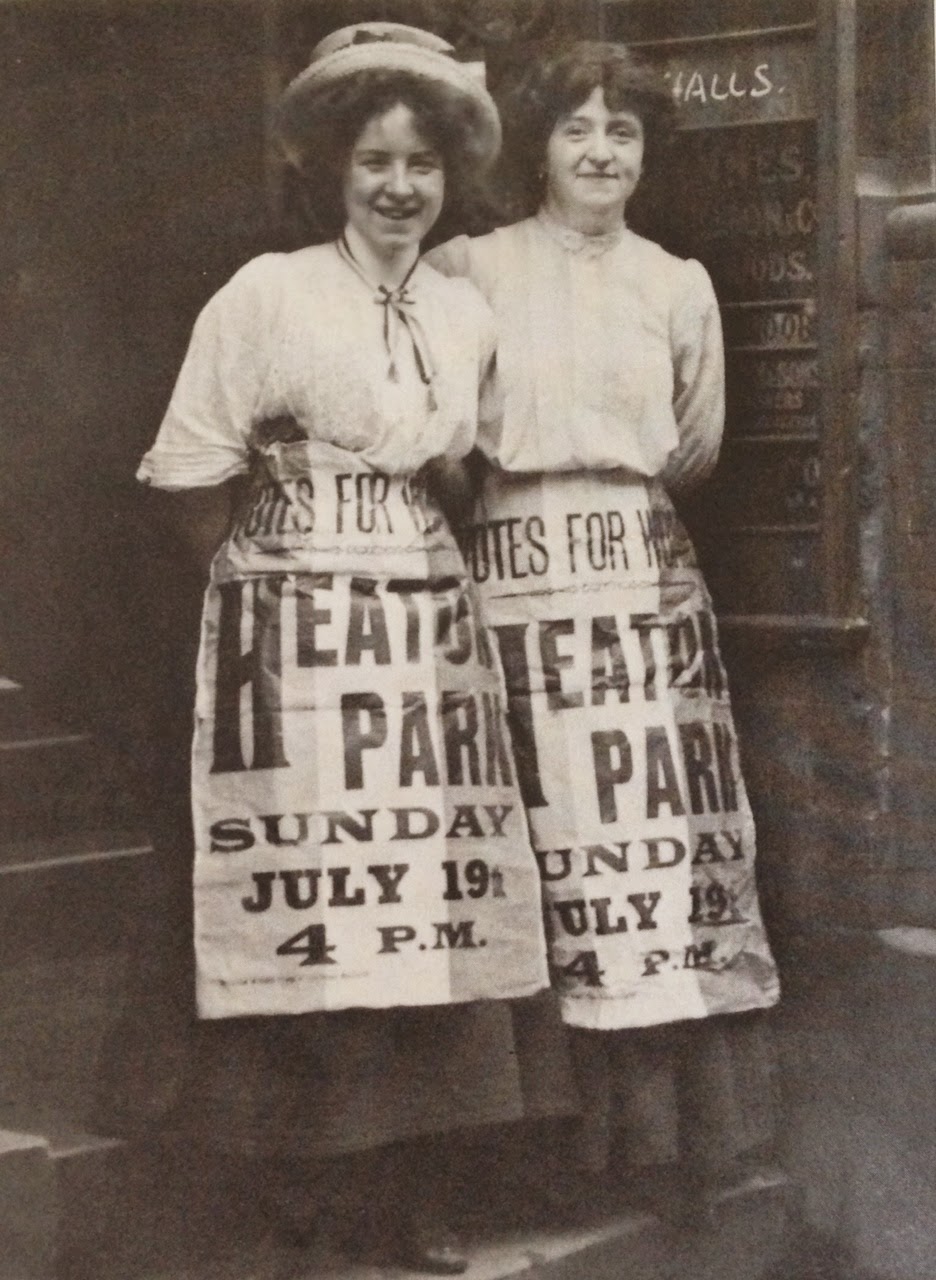At the Dressing/Undressing the Victorians: Reading
Clothes in Victorian and Neo-Victorian Contexts Conference at the
University of Chester (28th March 2015), Fiona McGrath’s paper on ‘Discourses of Fashion:
Articulating a Subversive Feminist Voice through Clothing at the fin de siècle’
got me thinking about the political dress of the suffragettes. A paper on
suffragette dress was obviously appropriate for – and yet surprisingly absent
from – the conference, although McGrath’s discussion of the symbolic language
of dress in relation to New Women of the late nineteenth century was certainly
related. The
daring, stylish and highly visible suffragettes demonstrated a strong sense of
the importance and power of dress and self-representation by creating designs,
colour-ways, garments and accessories to support their fight for female
emancipation.
The suffragettes used clothing as a form of communication
rather than simply a form of feminine decoration or ornamentation; instead of using
dress to attract and gratify the male gaze, they used it to challenge
patriarchy. Not only did nineteenth-century feminists (New Women, suffragists,
suffragettes) wear clothes that were practical, functional and convenient –
facilitating physical freedom in defiance of restrictive feminine fashions
featuring tight lacing and crinoline – but they also used these clothes to make
explicit statements about female liberation. Dress became a central element of
early feminist propaganda: skirts featuring slogans were worn to advertise suffragette
literature and events; ‘Votes for Women’ sashes were worn across the body; symbolic
jewellery was worn in the distinctive WSPU (Women’s Social and Political Union)
colours of purple, white and green (representing royalty, purity and hope); and
hand-made banners carried by women on marches were almost extensions of their
clothing. The suffragettes realised the potential of dress to make powerful and
subversive political statements.
By
1909 the WSPU was commissioning a wide range of badges, brooches, pendants and
pins as fundraising and promotional items. Suffragette artists used
prison-themed symbolic imagery to promote the women’s cause, and suffragettes
often wore pieces of chain as pins or brooches to represent their oppression. A
tin badge designed by Sylvia Pankhurst (1909-10) for the suffragette campaign
depicts a barefoot woman in a loose dress breaking free through a gate,
carrying a ‘Votes for Women’ streamer. The Holloway Prison Brooch also designed
by Sylvia Pankhurst (1909-10) comprises a portcullis symbol of the House of
Commons, superimposed with a broad arrow (typical of those marked on prison
clothing), which was presented to suffragette ex-prisoners (often arrested for
disorderly behaviour) and worn by them with great pride. Dolls dressed as
suffragette prisoners were made and sold to raise funds for the militant
suffragette campaign, and a special medal was made as a mark of recognition for
those suffragettes who served prison sentences for militancy. However, a more restrained type of Edwardian dress was
worn by some women’s suffrage leaders in a deliberate strategy to present
themselves as rational and ‘ladylike’ in the face of popular negative stereotypes
of suffragettes as hysterical, violent, manly and vulgar.
The suffragettes further illustrate McGrath’s argument
that dress is a material signifier which renders rich information about – and
provides a more overt description of – women’s characters, beliefs and
aspirations. Dress was central to early feminist iconography, the self-fashioning
of suffragettes, and the effectiveness of the women’s rights movement. More material
evidence for this can be found at the Women,
Fashion, Power exhibition at the Design Museum in London.
(The conference organisers, Deborah, Louisa and Sarah, would like to thank Lucy Ella for her contribution to this blog.)

When it comes to women's fashion there is always a gteat variety of products online.
ReplyDeleteChicks Alley has something for every taste. I'm very pleased with my purchases from there.
nice article. thanks for sharing.
ReplyDeleteafrican lace fabrics
nice blog. thanks for shearing.We have a great collection of African fabrics. Visit us hope you guys love them.
ReplyDeleteSequin Fabrics
i really like this article please keep it upEid Collection 2017
ReplyDeleteNice Post
ReplyDelete